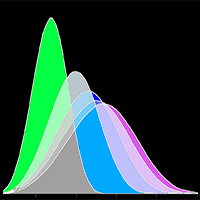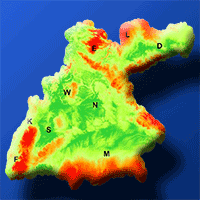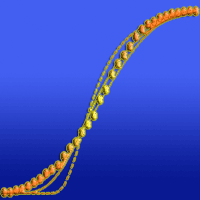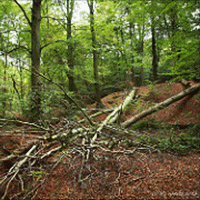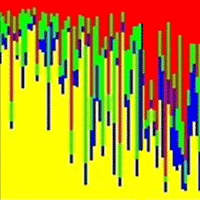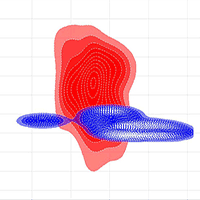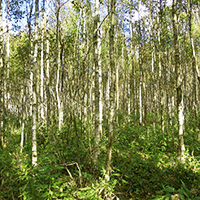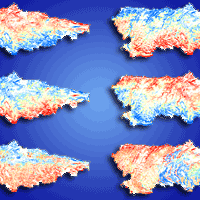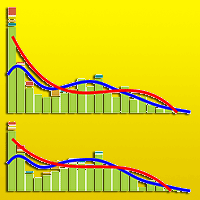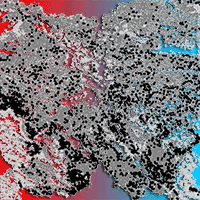
Evaluation of estimation methods for fitting the three-parameter Weibull distribution to European beech forests
Ziva Bončina (1-2), Vasilije Trifković (1), Christian Rosset (3), Matija Klopčič (1)
iForest - Biogeosciences and Forestry, Volume 15, Issue 6, Pages 484-490 (2022)
doi: https://doi.org/10.3832/ifor4145-015
Published: Dec 01, 2022 - Copyright © 2022 SISEF
Research Articles
Abstract
We evaluated three estimation methods for fitting the three-parameter Weibull distribution to even-aged European beech (Fagus sylvatica) forests by using experimental tree diameter data collected in 3709 sample plots (500 m2 each). The maximum likelihood estimation method (MLE), the method of moments (MOM) and the method of modified moments type 1 (MM1) were applied for fitting the Weibull function. The goodness-of-fit of stand parameters (total tree number, stand basal area, dominant stand diameter and mean quadratic diameter) was tested by MAE and RMSE, and the probability and cumulative density functions of trees per 5 cm diameter classes were additionally tested by the Kolmogorov-Smirnov test and compared with Kolmogorov-Smirnov’s D statistic. All three methods are suitable for estimating stand parameters based on the fitted Weibull function. Fitting the diameter distribution per 5 cm diameter classes at the plot level was less accurate due to the low number of trees or irregular diameter distribution of trees. The MM1 method was found to be the most suitable for fitting the three-parameter Weibull distribution to beech forests represented by data derived from small plots.
Keywords
Diameter Distribution Fitting, Weibull Function, Parameter Estimation, Inventory Data, Circular Sample Plots, Near-natural Forests, Fagus Sylvatica, Slovenia
Authors’ Info
Authors’ address
Vasilije Trifković 0000-0002-7533-5708
Matija Klopčič 0000-0003-2619-9073
Department of Forestry and Renewable Forest Resources, Biotechnical Faculty, University of Ljubljana, Večna pot 83, 1000 Ljubljana (Slovenia)
Slovenia Forest Service, Večna pot 2, 1000 Ljubljana (Slovenia)
Forest Ecosystem and Management, School of Agricultural, Forest and Food Sciences, HAFL, Bern University of Applied Sciences, Länggasse 85, 3052 Zollikofen (Switzerland)
Corresponding author
Paper Info
Citation
Bončina Z, Trifković V, Rosset C, Klopčič M (2022). Evaluation of estimation methods for fitting the three-parameter Weibull distribution to European beech forests. iForest 15: 484-490. - doi: 10.3832/ifor4145-015
Academic Editor
Andrea Cutini
Paper history
Received: May 30, 2022
Accepted: Sep 27, 2022
First online: Dec 01, 2022
Publication Date: Dec 31, 2022
Publication Time: 2.17 months
Copyright Information
© SISEF - The Italian Society of Silviculture and Forest Ecology 2022
Open Access
This article is distributed under the terms of the Creative Commons Attribution-Non Commercial 4.0 International (https://creativecommons.org/licenses/by-nc/4.0/), which permits unrestricted use, distribution, and reproduction in any medium, provided you give appropriate credit to the original author(s) and the source, provide a link to the Creative Commons license, and indicate if changes were made.
Web Metrics
Breakdown by View Type
Article Usage
Total Article Views: 27261
(from publication date up to now)
Breakdown by View Type
HTML Page Views: 22447
Abstract Page Views: 2748
PDF Downloads: 1651
Citation/Reference Downloads: 1
XML Downloads: 414
Web Metrics
Days since publication: 1158
Overall contacts: 27261
Avg. contacts per week: 164.79
Citation Metrics
Article Citations
Article citations are based on data periodically collected from the Clarivate Web of Science web site
(last update: Mar 2025)
Total number of cites (since 2022): 2
Average cites per year: 0.50
Publication Metrics
by Dimensions ©
Articles citing this article
List of the papers citing this article based on CrossRef Cited-by.
References
Buchenwälder [Beech forests]. In: “Karte der natürlichen Vegetation Europas (Maßstab 1: 2.500.000)” [Map of the Natural Vegetation of Europe (scale 1:2.500.000)]. Landwirtschaftsverlag, Münster, Germany, pp. 523. [in German]
Gscholar
Gozdni rastiščni tipi Slovenije: vegetacijske, sestojne in upravljavske značilnosti [Forest vegetation types in Slovenia: vegetation, stand, and management characteristics]. Biotechnical Faculty, Department of Forestry and Renewable Forest Resources and Slovenia Forest Service, Ljubljana, Slovenia, pp. 575. [in Slovenian]
Gscholar
SiWaWa 2.0 et Placettes Permanentes de Suivi Sylvicole (PPSS). Rapport Final, SiWaWa, un modèle d’inventaire et de croissance à l’échelle du peuplement 2018 [SiWaWa 2.0 and Permanent Silvicultural Monitoring Plots (PPSS). Final Report, SiWaWa, a stand-scale inventory and growth model 2018]. Office fédéral de l’environnement - OFEV, Division Forêts, Berne, Switzerland, pp. 127. [in French]
Gscholar
Letno poročilo o gozdovih za leto 2020 [Annual report on forests for 2020]. Slovenia Forest Service, Ljubljana, Slovenia, pp. 125. [in Slovenian]
Gscholar
PROGNAUS ein abstandsunabhangiger Wachstumssimulator fur ungleichaltrige Mischbestande [PROGNAUS a distance-independent growth simulator for mixed stands of the same age]. Deutscher Verband Forstlicher Forschungsanstalten, Sektion Ertragskunde, Eberswald, Berlin, Germany, pp. 173-183. [in German]
Gscholar
A statistical theory of the strength of material. Ingeniors Vetenskapa Acadamiens Handligar 151: 1-45.
Gscholar

